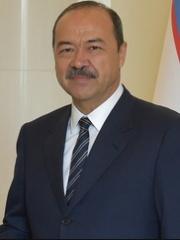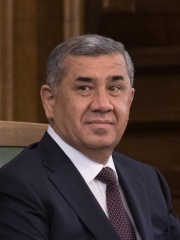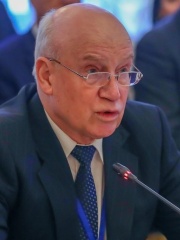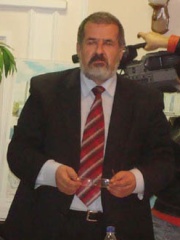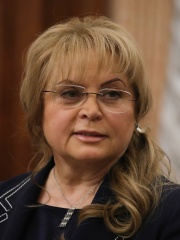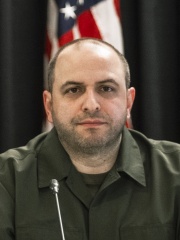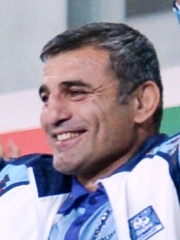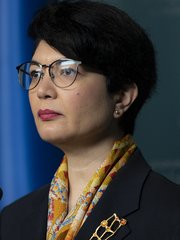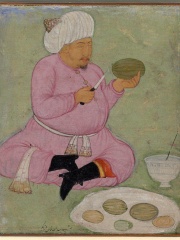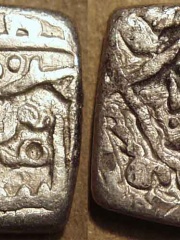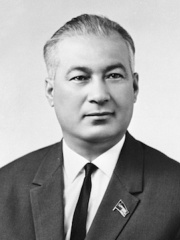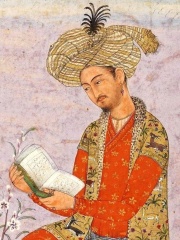
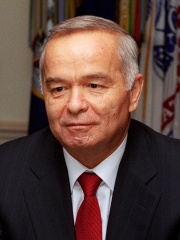
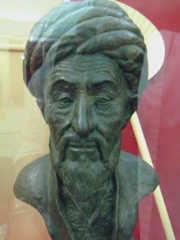
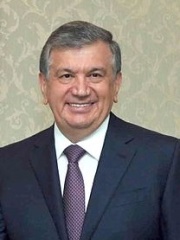
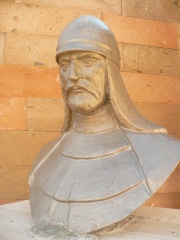
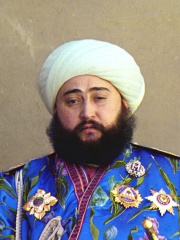
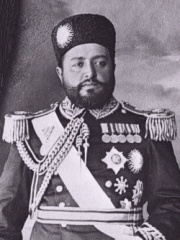
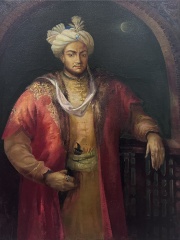
The Most Famous
POLITICIANS from Uzbekistan
This page contains a list of the greatest Uzbekistani Politicians. The pantheon dataset contains 19,576 Politicians, 33 of which were born in Uzbekistan. This makes Uzbekistan the birth place of the 85th most number of Politicians behind Slovenia, and Ethiopia.
Top 10
The following people are considered by Pantheon to be the top 10 most legendary Uzbekistani Politicians of all time. This list of famous Uzbekistani Politicians is sorted by HPI (Historical Popularity Index), a metric that aggregates information on a biography's online popularity. Visit the rankings page to view the entire list of Uzbekistani Politicians.

1. Babur (1483 - 1530)
With an HPI of 81.60, Babur is the most famous Uzbekistani Politician. His biography has been translated into 94 different languages on wikipedia.
Babur (Persian: ببر, Persian: [bɑː.βuɾ]; 14 February 1483 – 26 December 1530; born Zahīr ud-Dīn Muhammad) was the founder of the Mughal Empire in the Indian subcontinent. He was a descendant of Timur and Genghis Khan through his father and mother respectively. He was also given the posthumous name of Firdaws Makani ('Dwelling in Paradise'). Born in Andijan in the Fergana Valley (now in Uzbekistan), Babur was the eldest son of Umar Shaikh Mirza II (1456–1494, Timurid governor of Fergana from 1469 to 1494) and a great-great-great-grandson of Timur (1336–1405). Babur ascended the throne of Fergana in its capital Akhsikath in 1494 at the age of twelve and faced rebellion. He conquered Samarkand two years later, only to lose Fergana soon after. In his attempt to reconquer Fergana, he lost control of Samarkand. In 1501, his attempt to recapture both the regions failed when the Uzbek prince Muhammad Shaybani defeated him and founded the Khanate of Bukhara. In 1504, he conquered Kabul, which was under the putative rule of Abd ur-Razaq Mirza, the infant heir of Ulugh Beg II. Babur formed a partnership with the Safavid emperor Ismail I and reconquered parts of Turkestan, including Samarkand, only to again lose it and the other newly conquered lands to the Shaybanids. After losing Samarkand for the third time, Babur turned his attention to India and employed aid from the neighbouring Safavid and Ottoman empires. He defeated Ibrahim Lodi, the Sultan of Delhi, at the First Battle of Panipat in 1526 and founded the Mughal Empire. Before the defeat of Lodi at Delhi, the Sultanate of Delhi had been a spent force, long in a state of decline. The ruler of the adjacent Kingdom of Mewar, Rana Sanga, advanced on Babur with a grand coalition of Rajput and Afghan warlords, engaging Babur in the Battle of Khanwa. Babur achieved a decisive victory due to his skillful troop positioning and use of gunpowder. The battle was one of the most decisive events in Indian history and was a watershed event in the Mughal conquest of North India. Religiously, Babur started his life as a staunch Sunni Muslim, but he underwent significant evolution. Babur became more tolerant as he conquered new territories and grew older, allowing other religions to peacefully coexist in his empire and at his court. He also displayed a certain attraction to theology, poetry, geography, history, and biology—disciplines he promoted at his court—earning him a frequent association with representatives of the Timurid Renaissance. His religious and philosophical stances are characterized as humanistic. Babur married several times. Notable among his children were Humayun, Kamran Mirza, Hindal Mirza, Masuma Sultan Begum, and the author Gulbadan Begum. Babur died in 1530 in Agra and Humayun succeeded him. Babur was first buried in Agra but, as per his wishes, his remains were moved to Kabul and reburied. He ranks as a national hero in Uzbekistan and Kyrgyzstan. Many of his poems have become popular folk songs. He wrote the Baburnama in Chaghatai Turkic; it was translated into Persian during the reign (1556–1605) of his grandson, the emperor Akbar.

2. Islam Karimov (1938 - 2016)
With an HPI of 76.96, Islam Karimov is the 2nd most famous Uzbekistani Politician. His biography has been translated into 90 different languages.
Islam Abduganiyevich Karimov (30 January 1938 – 2 September 2016) was an Uzbekistani politician who served as the first president of Uzbekistan, from the country's independence in 1991 until his death in 2016. He was the last First Secretary of the Communist Party of Uzbekistan from 1989 to 1991, when the party was reconstituted as the People's Democratic Party of Uzbekistan (O‘zXDP); he led the O‘zXDP until 1996. He was the President of the Uzbek SSR from 24 March 1990 until he declared the independence of Uzbekistan on 1 September 1991. He declared Uzbekistan as an independent nation on 31 August 1991. He subsequently won the presidential election on 30 December 1991, with 86% of the vote. Foreign observers and the opposition cited voting irregularities, alleging state-run propaganda and a falsified vote count. Karimov's first presidential term was extended to 2000 by way of a referendum, and he was re-elected in 2000, 2007 and 2015, each time receiving over 90% of the vote. He died from a stroke on 2 September 2016, after being president of the country for 25 years. He ruled a repressive authoritarian regime in Uzbekistan where political opponents were assassinated, human rights were repressed, and dissent was prohibited.

3. Shah Rukh (1377 - 1447)
With an HPI of 74.37, Shah Rukh is the 3rd most famous Uzbekistani Politician. His biography has been translated into 38 different languages.
Shah Rukh or Shahrukh Mirza (Uzbek: Shohruh, Persian: شاهرخ, Šāhrokh; 20 August 1377 – 13 March 1447) was the ruler of the Timurid Empire between 1405 and 1447. He was the son of the Central Asian conqueror Timur (Tamerlane), who founded the Timurid dynasty in 1370. However, Shah Rukh ruled only over the eastern portion of the empire established by his father, comprising most of Persia and Transoxiana, the western territories having been lost to invaders in the aftermath of Timur's death. In spite of this, Shah Rukh's empire remained a cohesive dominion of considerable extent throughout his reign, as well as a dominant power in Asia. Shah Rukh controlled the main trade routes between Asia and Europe, including the legendary Silk Road, and became immensely wealthy as a result. He chose to have his capital not in Samarqand as his father had done, but in Herat. This was to become the political centre of the Timurid empire and residence of his principal successors, though both cities benefited from the wealth and privilege of Shah Rukh's court. Shah Rukh was a great patron of the arts and sciences, which flourished under his rule. He spent his reign focusing on the stability of his lands, as well as maintaining political and economic relations with neighbouring kingdoms. In the view of historians Thomas W. Lentz and Glenn D. Lowry, "unlike his father, Shahrukh ruled the Timurid empire, not as a Turco-Mongol warlord-conqueror, but as an Islamic sultan. In dynastic chronicles he is exalted as a man of great piety, diplomacy, and modesty—a model Islamic ruler who repaired much of the physical and psychological damage caused by his father."

4. Shavkat Mirziyoyev (b. 1957)
With an HPI of 72.90, Shavkat Mirziyoyev is the 4th most famous Uzbekistani Politician. His biography has been translated into 85 different languages.
Shavkat Miromonovich Mirziyoyev (born 24 July 1957) is an Uzbek politician who has served as the second president of Uzbekistan since 2016. A member of the Uzbekistan Liberal Democratic Party (UzLiDeP), he served as the third prime minister under President Islam Karimov from 2003 to 2016. Mirziyoyev has also served as chairman of the Organization of Turkic States since 2022. Mirziyoyev joined the Communist Party of the Soviet Union in the late 1980s. He was elected as a deputy of the Supreme Soviet of the Uzbek SSR in 1990. From mid-1990s, he headed several regions of Jizzakh and Samarqand as a governor (hakim) before his appointment as prime minister by then-President Karimov. Following the death of President Karimov, Mirziyoyev was appointed by the Oliy Majlis as acting president of Uzbekistan on 8 September 2016. He was subsequently elected to a full five-year term as president in the 2016 election from the Uzbekistan Liberal Democratic Party (OʻzLiDeP), winning 88.6% of the vote. Mirziyoyev was re-elected for second five-year term with 80.3% of the vote in the 2021 presidential election, and then again for a renewed first seven-year term with 87.7% of the vote in a snap 2023 presidential election as an independent candidate with the OʻzLiDeP backing, after a constitutional amendment had granted him to legally run for third time after resetting his presidential term of office. Under his presidency, Mirziyoyev implemented a range of liberal reforms in Uzbekistan’s political system, economy by creating a favorable business-climate, attracting foreign investment and re-integrating the country into the WTO, consolidation and unity of Central Asian region through resolution of pressing issues by attracting foreign investment, development of an open foreign policy and multifaceted cooperation with the Western, European, Eastern and Middle East countries, as well as release of political prisoners that was notably accompanied by closure of the infamous Jaslyk Prison in 2019. In late 2021, he announced a series of constitutional reforms which included the protection of human rights, which were ratified following the 2023 constitutional referendum with an overwhelming 90.6% of support. One of the proposed changes had initially included a removal of the semi-autonomous Karakalpakstan's right to secession, which led to deadly unrest in the region in July 2022 with the protests being brutally suppressed and resulting in the scrapping of the controversial proposal.
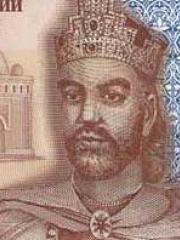
5. Isma'il ibn Ahmad (849 - 907)
With an HPI of 71.47, Isma'il ibn Ahmad is the 5th most famous Uzbekistani Politician. His biography has been translated into 31 different languages.
Abū Ibrāhīm Ismā'īl ibn-i Aḥmad-i Sāmāni (Persian: ابو ابراهیم اسماعیل بن احمد سامانی; May 849 – 24 November 907), better known simply as Amir Ismail-i Samani (اسماعیل سامانی), and also known as Isma'il ibn-i Ahmad (اسماعیل بن احمد), was the Samanid amir of Transoxiana (892–907) and Khorasan (900–907). His reign saw the emergence of the Samanids as a powerful force. He was the son of Ahmad ibn-i Asad and a descendant of Saman Khuda, the eponymous ancestor of the Samanid dynasty who renounced Zoroastrianism and embraced Islam.

6. Alp-Tegin (963 - 963)
With an HPI of 70.54, Alp-Tegin is the 6th most famous Uzbekistani Politician. Her biography has been translated into 31 different languages.
Alp-Tegin, (Persian: الپتگین Alptegīn or Alptigīn) or Alptekin, was a Turkic slave commander of the Samanid Empire, who would later become the semi-independent governor of Ghazna from 962 until his death in 963. Before becoming governor of Ghazni, Alp-Tegin was the commander-in-chief (sipahsalar) of the Samanid army in Khorasan. In a political fallout over succession of the Samanids he crossed the Hindu Kush mountains southward and captured Ghazna, located strategically between Kabul and Kandahar in present-day Afghanistan, and thereby establishing his own principality, which, however, was still under Samanid authority. He was succeeded by his son, Abu Ishaq Ibrahim.

7. Mohammed Alim Khan (1880 - 1944)
With an HPI of 70.09, Mohammed Alim Khan is the 7th most famous Uzbekistani Politician. His biography has been translated into 32 different languages.
Emir Sayyid Mir Muhammad Alim Khan (Chagatai and Persian: سید میر محمد عالم خان, 3 January 1880 – 28 April 1944) was the last emir of the Uzbek Manghit dynasty, rulers of the Emirate of Bukhara in Central Asia, Although Bukhara was a protectorate of the Russian Empire from 1873, the Emir presided over the internal affairs of his emirate as an absolute monarch and reigned from 3 January 1911 to 30 August 1920.

8. Habibullah Khan (1872 - 1919)
With an HPI of 66.85, Habibullah Khan is the 8th most famous Uzbekistani Politician. His biography has been translated into 38 different languages.
Habibullah Khan Barakzai (3 June 1872 – 20 February 1919) was the Emir of Afghanistan from 1901 until his assassination in 1919 by Shuja-ud-Daula Ghourbandi. He was the eldest son of the Emir Abdur Rahman Khan, whom he succeeded by right of primogeniture in October 1901. His grandfather was Mohammad Afzal Khan.

9. Abdal-Latif Mirza (1420 - 1450)
With an HPI of 66.47, Abdal-Latif Mirza is the 9th most famous Uzbekistani Politician. Her biography has been translated into 20 different languages.
Abdal-Latif Mirza (c. 1420 – 9 May 1450) was the great-grandson of Central Asian emperor Timur. He was the third son of Ulugh Beg, Timurid ruler of Transoxiana (modern Uzbekistan, Tajikistan and parts of Turkmenistan, Kyrgyzstan and Kazakhstan) and Roqya Katun Arolat.
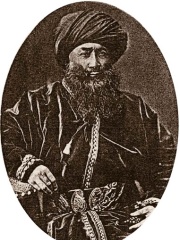
10. Yaqub Beg (1820 - 1877)
With an HPI of 65.81, Yaqub Beg is the 10th most famous Uzbekistani Politician. His biography has been translated into 27 different languages.
Muhammad Yakub Beg (c. 1820 – 30 May 1877), later known as Yakub Padishah, was the Kokandi ruler of Yettishar (Kashgaria), a state he established in Xinjiang from 1865 to 1877. He was recognized as Emir of Yettishar by the Ottoman Empire and held the title of "Champion Father of the Faithful".
People
Pantheon has 33 people classified as Uzbekistani politicians born between 849 and 1985. Of these 33, 12 (36.36%) of them are still alive today. The most famous living Uzbekistani politicians include Shavkat Mirziyoyev, Abdulla Aripov, and Nigmatilla Yuldashev. The most famous deceased Uzbekistani politicians include Babur, Islam Karimov, and Shah Rukh. As of April 2024, 2 new Uzbekistani politicians have been added to Pantheon including Tamila Tasheva, and Vladimir Lebedev.
Living Uzbekistani Politicians
Go to all RankingsShavkat Mirziyoyev
1957 - Present
HPI: 72.90
Abdulla Aripov
1962 - Present
HPI: 64.80
Nigmatilla Yuldashev
1962 - Present
HPI: 58.86
Sergey Lebedev
1948 - Present
HPI: 56.47
Refat Chubarov
1957 - Present
HPI: 56.25
Abdulhashim Mutalov
1947 - Present
HPI: 55.23
Ella Pamfilova
1953 - Present
HPI: 53.26
Rustem Umerov
1982 - Present
HPI: 52.97
Boris Nadezhdin
1963 - Present
HPI: 51.11
Movlud Miraliyev
1974 - Present
HPI: 46.75
Tamila Tasheva
1985 - Present
HPI: 39.87
Vladimir Lebedev
1984 - Present
HPI: 33.76
Deceased Uzbekistani Politicians
Go to all RankingsBabur
1483 - 1530
HPI: 81.60
Islam Karimov
1938 - 2016
HPI: 76.96
Shah Rukh
1377 - 1447
HPI: 74.37
Isma'il ibn Ahmad
849 - 907
HPI: 71.47
Alp-Tegin
963 - 963
HPI: 70.54
Mohammed Alim Khan
1880 - 1944
HPI: 70.09
Habibullah Khan
1872 - 1919
HPI: 66.85
Abdal-Latif Mirza
1420 - 1450
HPI: 66.47
Yaqub Beg
1820 - 1877
HPI: 65.81
Abdullah Khan II
1533 - 1598
HPI: 65.22
Mirza Muhammad Haidar Dughlat
1499 - 1551
HPI: 64.19
Sharof Rashidov
1917 - 1983
HPI: 63.28
Newly Added Uzbekistani Politicians (2025)
Go to all RankingsOverlapping Lives
Which Politicians were alive at the same time? This visualization shows the lifespans of the 12 most globally memorable Politicians since 1700.

